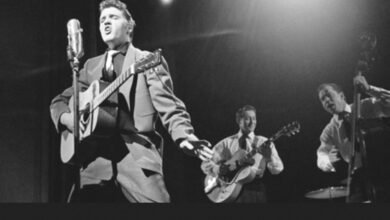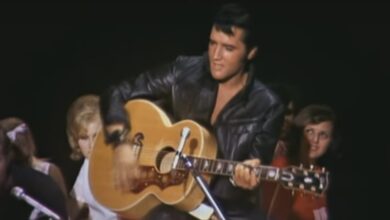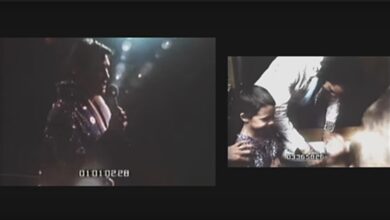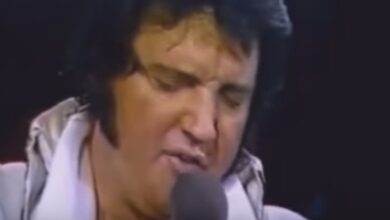Even after fifty years, this Elvis song outshines anything from today’s music scene
Elvis Presley’s rendition of “Can’t Help Falling in Love” stands as a pinnacle of romantic balladry, originally released in 1961 as part of the soundtrack for his film “Blue Hawaii.” The song quickly captivated listeners with its heartfelt lyrics, composed by Hugo Peretti, Luigi Creatore, and George David Weiss, and Elvis’s signature smooth vocals. Its enduring popularity has solidified it as one of Presley’s most cherished songs, transcending generations and genres.
The song’s opening lines, “Wise men say only fools rush in / But I can’t help falling in love with you,” set the tone for a narrative of unguarded affection and unconditional commitment. Elvis’s delivery imbues these lyrics with a sincerity that resonates deeply, evoking the vulnerability and passion of falling in love. As the song progresses, lines like “Take my hand, take my whole life too / For I can’t help falling in love with you” underscore a sentiment of complete surrender to love’s transformative power.
Elvis’s interpretation of “Can’t Help Falling in Love” is characterized by its simplicity and emotional depth. Accompanied by a gentle piano melody that builds to a stirring crescendo, his rendition captures the essence of romance with subtlety and grace. His velvety vocals soar effortlessly through each verse, conveying both longing and devotion in equal measure. The song’s arrangement, marked by its melodic clarity and orchestral backing, enhances its timeless appeal, ensuring its place as a classic love ballad.
Beyond its musical excellence, “Can’t Help Falling in Love” has left an indelible mark on popular culture. It has been featured in numerous films, television shows, and commercials over the years, further embedding itself in the collective consciousness. Each usage reinforces its role as a universal anthem of love and devotion, resonating across diverse audiences and contexts.
Elvis Presley, born in Tupelo, Mississippi, in 1935, emerged as a transformative figure in the history of popular music. From his groundbreaking recordings at Sun Records in the 1950s to his evolution as a cultural icon in the 1960s and beyond, Elvis’s influence spanned genres from rock and roll to gospel, country, and blues. His distinctive voice and magnetic stage presence endeared him to fans worldwide, earning him the title “The King of Rock and Roll.”
Throughout his career, Elvis’s ability to connect emotionally with audiences distinguished him as a consummate performer. His impact extended beyond music into film, where he starred in a series of successful movies that showcased his charisma and versatility as an actor. “Blue Hawaii,” released in 1961, marked a pivotal moment in his film career, with “Can’t Help Falling in Love” becoming a standout track synonymous with both the movie and its star.
Elvis Presley’s legacy continues to resonate decades after his passing in 1977. His contributions to music and popular culture remain unparalleled, with “Can’t Help Falling in Love” serving as a timeless testament to his enduring artistry. As audiences continue to rediscover and reinterpret his music, Elvis’s influence as a cultural icon endures, inspiring new generations of artists and listeners alike.
In conclusion, Elvis Presley’s interpretation of “Can’t Help Falling in Love” exemplifies his ability to capture the essence of romance through music. With its poignant lyrics and soulful delivery, the song remains a cherished part of his legacy, embodying the universal themes of love and devotion. Its enduring popularity across decades underscores Elvis’s enduring impact on music and culture, cementing his status as a legendary figure in the annals of popular music history.
YouTube URL(s):



